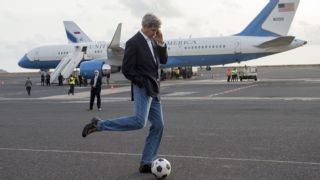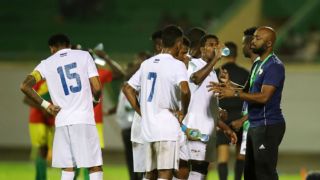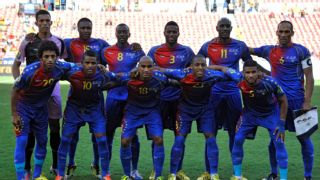|
Cape Verde's ascent through African international football over the past decade has been remarkable, and at the heart of their progress is Janito Carvalho, one of two air traffic controllers to have taken an influential role in the tiny island nation's rise through the African game. Carvalho, along with his friend and fellow coach Luis Antunes, have overseen the progression and sporting education of the country's finest footballing generation, while simultaneously juggling jobs as air traffic controllers, working across the West African archipelago's four major airports. "I love being an air traffic controller, I've done this almost all of my life," Carvalho told ESPN. "For 20 years I've been an air traffic controller, and since 10 years ago, more actively, I've been a coach. "I take the good things that being an air traffic controller brings to coaching. That is the concentration, the discipline, trying to do things at the right moment. "In this job, you have to decide things just like that, and football is the same, it's about being brave, about having courage to do things at the right moment. "If that moment passes you, it's gone." Carvalho, who is currently coach of the home-based Cape Verde side, has played a key role in developing the nation's youth players at the country's academy, inaugurated in 2007, assisting Antunes with the senior side, and preparing players for life in professional leagues outside the islands.  However, he's done all this while juggling his role as one of the country's 50 air traffic controllers, guiding tourists into this cluster of islands in the Atlantic, 350 miles off the coast of West Africa. "Of course, it's about strategy," he added. "You have five or six planes coming, you know they all want to land and each wants to land first. "You have to have a strategy, you have to put them all in a line, and you have to make sure that each lands without delaying the other planes. "Football is like that, you have to look at your opponents, decide what he wants to do, and then try and stop him in some way. "I don't feel [pressure] much at all, as I'm used to this as an air traffic controller. When I go to work, everything has to be at the correct time, everything has to be right." Triumph from tragedy Carvalho didn't have a previous career as a footballer before stepping into coaching roles, with his progress as a youngster curtailed by a car crash as a 13-year-old which left him with a broken femur and claimed the life of his younger brother. "I had three years with this long rod, and it was a problem for me to play, because I could break it again." After finishing school, Carvalho had hoped to travel to Portugal to study, but when that opportunity didn't materialise, he fell into air traffic controlling after winning a contest as one of 12 people picked from 800 hopefuls for an apprenticeship in the profession. He was also spotted by Cesar Semedo, the vice president of Boavista de Praia, who had overseen his inspirational displays during his team's successes in the local futsal league and saw the potential for a leadership role behind the scenes at the ambitious capital club.  Initially, Carvalho helped out with Boavista's logistics, transport, and as the team's delegate, but when the opportunity came to compete for a spot on a coaching course in the Netherlands, he jumped at the chance, with Semedo's backing, to transition into a different role within the game. "When opportunity shows up, you just have to grab it," Carvalho remembers, "because when it goes, it goes, and you don't have it anymore. "I had no experience [in coaching], but things went well and what helped me a lot was the fact that I could understand English better than my colleagues." He was chosen along with Antunes and Bassana Crato, Cape Verde's captain during the 1980s, and took the first formal steps in an education that would go on to underpin the islanders' climb up the African standings. "I was surprised of course," he added, "because I hadn't been a coach before. I'd coached my colleagues, my neighbours, my friends when we'd coached futsal, and sometimes my kids, on the beach but nothing like this. "Taking this opportunity, going to Holland, was the best way to start." Returning home Upon his return, he took up an assistant coaching role in the lower leagues, before taking the reins of modest GD Varanda de Achadinha, with whom he won the second division title. From there, he progressed to the Cape Verdean top flight as an assistant to Oscar Duarte at Boavista, before being given the top job on his own during the 2008-09 season. Victory in the Santiago Cup followed in that campaign, before Carvalho oversaw a league and cup double the season afterwards, ending Boavista's 15-year wait for a domestic championship. An appointment to work with the national side was the next logical step, and Carvalho was approached by then-head coach and technical director Joao de Deus, currently assistant to former Benfica coach Jorge Jesus at Brazilian giants Flamengo, to coach at and then, two months later, oversee the country's Jorge Andrade football academy.  "I worked a lot with de Deus," Carvalho recalls. "He brought a new strategy, a new philosophy of coaching to Cape Verde, it went well with the way of learning in Holland, so it was very good to put those two things together. "That's why I had good results." The seeds of success The work of de Deus, Carvalho and Antunes with Cape Verde's youth during the last decade ultimately sowed the seeds for the tiny country, with a population of half a million, to break into the upper echelons of the African game. Cape Verde reached a high of 27th in the FIFA world rankings in 2014, having been as low as 182 in 2000. "In 2009, we won in Portugal in the Jogos da Lusofonia [a multi-sport event for Lusophone countries], and since then we started to work more at youth level," Janito continued. "Players like Ryan Mendes, Gege and Heldon Nhuck were in that 2009 team, most them went into the A team, and most reached the Afcon in South Africa [in 2013, Cape Verde's qualification]. "We started with those guys very early so that, step by step, they could get to the A team and qualify for the first time, winning 2-0 in Cape Verde and then losing 2-1 in Cameroon, with the goal scored by Heldon [in October 2012]." Cape Verde followed that maiden qualification up with a spot at the 2015 tournament in Equatorial Guinea, but failed in their bids to reach either the 2017 or 2019 editions.  A return to the Africa Cup of Nations? While the side that reached the quarter finals of the Afcon in their first appearance were a Golden Generation, Carvalho is sure Cape Verde can bounce back in the campaign to reach Cameroon 2021. He adds: "We [deteriorated] a little bit, but now we're trying to elevate [the team] again, to bring in new players. "That was a golden generation, but we have a lot of great players in Cape Verde. They must have the opportunity to show themselves, and the right person to lead them. "My main goal in football is to help the guys to fly. Cape Verdean players have dreams, many of them didn't go to school, and they dream of playing abroad. "I'm driven to prepare them, tactically, and to focus them. Technically, they're good, but there are some tactical problems when they go abroad. "I try to help them so that when they leave the country, they can stay away, and play for the big clubs. My Boavista team who won everything in 2010, ten of them are playing abroad, in Portugal, in Egypt, in Dubai. "When you do that, when you are capable of preparing those players, it's the best reward you can have, the wining just stays in second place." Regardless of the joy and the buzz Carvalho gets from preparing players for life in the senior Cape Verde side, or for a career overseas, he maintains that nothing quite beats the excitement he gets from bringing a plane into land at one of the island airports. "A plane which has a problem, for example, you have 200 odd people inside, and their life depends on you, then when you land it safely, [you know] everyone is ok, everyone is alright. "You're saving lives, and it's an amazing feeling."
|

